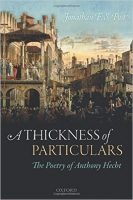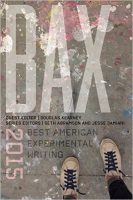February 3, 2016
Edited by David Sanders
Specimen Days
1832– George Crabbe, English vicar/poet (Borough), dies at 77.
1842– Sidney Clopton Lanier, US, composer/poet (Hall of Fame, is born.)
1870– Ada Negri, Italian poet/author (Il Libro di Mara), is born.
1887– Georg Trakl, Austrian poet (Autumn of the Lonely), is born.
1909– M Vasalis [Margaretha Droogleever Fortuyn-Leenmans], poet (Phoenix), is born.
1947– Paul Auster, US author/poet/director (Mr Vertigo, Smoke), is born.

In Hellbrun
Once more following the blue grief of the evening
Down the hill, to the springtime fishpond—
As if the shadows of those dead for a long time were
hovering above,
The shadows of church dignitaries, of noble ladies—
Their flowers bloom so soon, the earnest violets
In the earth at evening, and the clear water washes
From the blue spring. The oaks turn green
In such a ghostly way over the forgotten footsteps
of the dead
The golden clouds over the fishpond.
—Georg Trakl (1887–1914)
“The oaks turn green / In such a ghostly way over the forgotten footsteps / of the dead” —Georg Trakl (1887–1914)
World Poetry
Egypt Jails Prominent Writer for Insulting Islam

A prominent Egyptian writer was reportedly sentenced to three years in prison on Tuesday for blasphemy after criticising the slaughter of animals during a Muslim festival. Fatima Naoot, a poet and former parliamentary candidate, is the second public figure in Egypt to receive a jail term in less than a month for charges related to blasphemy. She was also fined $2,550.
Georgia: Poet and Rights Activist Convicted and Fined

On 25 December 2015 poet, activist and winner of the 2009 Oxfam Novib/PEN Awards for Freedom of Expression, Irakli Kakabadze, was arrested and injured during a peaceful demonstration protesting the appointment of Judge Levan Murusidze to the Appeals Court of Georgia’s High Council of Justice in Georgia. The appointment of Murusidze has been criticised by rights groups and activists amid claims that in 2007, Murusidze, then a member of the Criminal Chamber of the Supreme Court of the Republic of Georgia, reduced the sentences of four people convicted of murdering Sandro Girgvliani, the 28-year-old head of the international department of the United Georgian Bank.
A prominent Egyptian writer was sentenced to three years in prison for blasphemy after criticising the slaughter of animals.
Recent Reviews
Review: The Inventors and Other Poems
by Greg Bem
Whether an enduring fan of the complex writing of René Char, or a recent inductee, readers of the 20th century French poet will be greatly surprised and positively overwhelmed by the latest English translation. The Inventors and Other Poems (Seagull Books, 2015), translated by Mark Hutchinson, is the complementary follow-up to Hutchinson’s previous effort on Char, Hypnos: Notes from the French Resistance (also from Seagull Books, in 2014). Together, the writing in the Hypnos war journal, and eclectic offerings in The Inventors represent what Hutchinson refers to as “the heart” of this leading member of the French resistance and master of symbolism and psychological complexity.
All the Difference
Matthew Buckley Smith on David Orr's The Road Not Taken
This August, David Orr published two books with exactly the same title. One is a selection of Robert Frost’s early poems, which Orr edited. The other is a book-length essay distinguished from its sibling by a nail-on-the-head subtitle: The Road Not Taken: Finding America in the Poem Everyone Loves and Almost Everyone Gets Wrong. The day this book appeared, ten-thousand English majors across the nation clicked their tongues in unison and muttered, ‘I always meant to write that.’
Ted Hughes: The Unauthorised Life by Jonathan Bate
by Janet Malcolm
On page 313 of his biography of Ted Hughes, Jonathan Bate paraphrases a racy passage from the journal Sylvia Plath kept in the last months of her life:
On the day that she found Yeats’s house in Fitzroy Road, she rushed round in a fever of excitement to tell Al [Alvarez]. That evening, she noted in her journal with her usual acerbic wit, they were engaged in a certain activity when the telephone rang. She put her foot over his penis so that, as she phrased it, he was appropriately attired to receive the call.
Review: Rooms for Rent in the Burning City by Brandon Courtney
by Paul Scott Stanfield
In the days before Spotify and iTunes, rock bands faced a challenge known as the “sophomore album slump.” A new band typically had had a few years to compose and then hone in performance the songs that made up its first album; if the album did well enough to produce demand for a second, however, the band not only had a much briefer span in which to develop material, but also faced the puzzle of whether to stick to the style that had proven successful or change it up, so as to show ability to grow as artists—a puzzle many groups failed to solve.
This August, David Orr published two books with exactly the same title. One is a selection of Robert Frost’s poetry. The other is a book-length essay.
Broadsides
Poet-teachers on Teaching Poetry
Boston Review
The paradox of the new year: the promise of a fresh start brings us right back to the place where we began last time. As many college students and teachers head back into the classroom this week, we’ve asked four dynamic poet-teachers to write about the texts they return to—the poems they find themselves assigning over and over, the urgencies that recur seasonally, the arguments and inquiries they reprise with successive groups of students. Evie Shockley, Shane McCrae, DeSales Harrison, and Heather Christle have opened their classnotes and let us listen in.
Refugees at the Port of Piraeus
by A. E. Stallings
Desperate people fleeing a war-torn city in the Near East and seeking a new start in Europe lie at the heart of Western literature. Living in Athens through these extraordinary times, with refugees arriving by the thousands daily at the port of Piraeus on packed ferry boats, from Kos, Lesbos and other islands, I have often been thinking of the Aeneid. In Dryden’s famous translation of the opening: “Arms and the man I sing, who, forc’d by fate, / And haughty Juno’s unrelenting hate, / Expell’d and exil’d, left the Trojan shore”. “Expell’d and exil’d” is Dryden’s rendering of the single Latin word, profugus. I have been thinking about that word, perhaps because I hear the modern Greek equivalent, “prosfygas”, daily. I might translate it as “refugee”.
To What Do We Owe This Pleasure: On the Value of Not Writing
by Ada Limon

I am standing in the laundromat (our machines in the basement broke down some time ago and we think we might buy a house so we don’t buy new machines), therefore while I’m in Kentucky, I could be in Brooklyn or Detroit or anywhere, because it is a laundromat. I’m folding near a few other women. A Taylor Swift song comes on and we all sort of bob our heads. I start to think about whiteness and feminism. None of us in this laundromat are white or male, at least not completely. I think about writing a poem, but it’s so hard to see where it’s going. I imagine the long trains my older brother and I used to watch each summer in Southern California.
An essay by Limón on the laundromat, Taylor Swift, whitness, feminism, and writing poetry.
Drafts & Fragments
The Story Behind the Depressing Times Square Subway Poem That Turns 25 This Year
by Keri Blakinger

Welcome to the tunnel of gloom. Inside the Times Square subway station hangs a cryptic, depressing poem strung out along the ceiling beams of the tight, eerie underground passageway between 8th and 7th avenues.
These 9 Young Poets Are Actually Making the Genre Cool Again
Striking Similes
by Dan Piepenbring
There’s an abysmal simile making the rounds online right now, drawn from a certain splashy literary debut: “Breasts like bronzed mangoes.” Yes, it comes courtesy of a male writer, of course; and yes, Google suggests it’s the only use of the phrase “bronzed mangoes” in recorded history. Even so: as an object of ridicule, this is what you’d have to call low-hanging fruit.
Application for a Grant, Elizabeth Bishop
Elizabeth Bishop's application for a grant from the Rockefeller Foundation and letters from Elizabeth Bishop written to Gerald Freund.
In the Times Square subway station hangs a depressing poem along the ceiling beams of the passageway beneath 8th & 7th avenues
Poetry In the News
UK Poetry Boys Club Can't Handle a Young Woman Winning a Major Prize

The boys appear not to be happy. When the UK’s top prize for poetry, the TS Eliot Prize, was awarded to first-time poet Sarah Howe for her book Loop of Jade (Chatto) earlier this month, a whoop of joy went up in the room. Later at the party, I heard someone say: “I wonder how long it will be before everyone begins to hate her.” Not long, as it happens.
Recently, three male-centric media bastions have damned a 30-something woman for having won a major book award.
New Books
A Thickness of Particulars: The Poetry of Anthony Hecht by Jonathan Post
[Hardcover] Oxford University Press, 288 pp., $35.00

A Thickness of Particulars: The Poetry of Anthony Hecht is the first book-length study of one of the great formal poets of the later twentieth century (1923-2004). Making use of Hecht's correspondence, which the author edited, the volume situates Hecht's writings in the context of pre- and post-World War II verse, including poetry written by W. H. Auden, Elizabeth Bishop, Robert Lowell, James Merrill, and Richard Wilbur. In nine chapters, the book ranges over Hecht's full career, with special emphasis placed on the effects of the war on his memory; Hecht participated in the final push by the Allied troops in Europe and was involved in the liberation of the Flossenburg Concentration Camp. The study explores the important place Venice and Italy occupied in his imagination as well as the significance of the visual and dramatic arts and music more generally.
Straight James / Gay James by James Franco
[Paperback] Hansen Publishing Group, 60 pp., $12.00
Straight James / Gay James, actor James Franco's new chapbook of poems, explores the facets of his public and private personas. Straight James / Gay James is a poetic bildungsroman–raw, candid, and uninhibited. James Franco writes about life as an actor, sexuality, questions of identity, gender, family, Gucci, Lana Del Rey, James Dean, and Hollywood. His poetic style varies from the imagistic to the prosaic. The chapbook also contains an interview of "Gay James" conducted by "Straight James." Yes, Straight James asks the question: Let's get substantial: are you gay or what?
Sentenced to Life: Poems by Clive James
[Hardcover] Liveright, 80 pp., $24.95

In this new collection of "technically and emotionally heart-stopping poems" (Spectator)― including "Japanese Maple," which was published in The New Yorker to great acclaim―Clive James looks back over an extraordinarily rich life with a clear-eyed and unflinching honesty. There are regrets but no trace of self-pity in these verses, which―for all their grappling with death and his current illness―are primarily a celebration of what is treasurable and memorable in our time here.
Thief in the Interior by Phillip B. Williams
[Paperback] Alice James Books, 100 pp.,$15.95
Phillip B. Williams investigates the dangers of desire, balancing narratives of addiction, murders, and hate crimes with passionate, uncompromising depth. Formal poems entrenched in urban landscapes crack open dialogues of racism and homophobia rampant in our culture. Multitudinous voices explore one's ability to harm and be harmed, which uniquely juxtaposes the capacity to revel in both experiences.
BAX 2015: Best American Experimental Writing edited by Seth Abramson, Jesse Damiani, and Douglas Kearney
[Paperback] Wesleyan, 250 pp., $19.95

BAX 2015 is the second volume of an annual literary anthology compiling the best experimental writing in poetry, fiction, and creative nonfiction. This year’s volume, guest edited by Douglas Kearney, features seventy-five works by some of the most exciting American poets and writers today, including established authors—like Dodie Bellamy, Anselm Berrigan, Thomas Sayers Ellis, Cathy Park Hong, Bhanu Kapil, Aaron Kunin, Joyelle McSweeney, and Fred Moten—as well as emerging voices. Best American Experimental Writing is also an important literary anthology for classroom settings, as individual selections are intended to provoke lively conversation and debate.
BAX 2015 is the second volume of an annual literary anthology compiling the best experimental writing in poetry, fiction, and creative nonfiction.
Correspondences
‘Literature is against us': In Conversation with Anne Boyer
by Amy King

If you don’t know Anne Boyer’s work, you should. She’s a fierce intellect, tremendous poet, and laudable person. I’m grateful she spent time untangling my meandering questions. Her new book, Garments Against Women, is just out from Ahsahta Press, a perfect fit for Boyer’s words. We talk politics, protest, the personal and poetry. Boyer’s strength and insights make me hopeful, and that is worth everything.
Translating Tranströmer: An Interview with Patty Crane
by Danniel Schoonebeek
In the afterword to Bright Scythe, her new translation of Tomas Tranströmer’s selected poems, Patty Crane tells a fascinating, fatalist story about how she came to translate the late Swedish poet and Nobel Prize recipient. Crane moved with her family to Tumba, Sweden in 2007, after her husband took a job overseas at a paper mill. A year into her relocation, she took a summer residency at Vermont College and began flying back to the United States in order to focus on her writing. One evening she sat next to poet Jean Valentine in a cafeteria, and because Valentine had heard that Crane was living near Stockholm, she asked if Crane might deliver a book to her friend Tomas. A year later, Crane was sitting in Tomas Tranströmer’s home, speaking to him in Swedish, and beginning to translate his poem “The Station” into English. A few more years later—and this isn’t part of that fatalist afterword, but it’s part of our story today—a galley of Bright Scythe arrived at my studio in the Catskills and the doors that seemed to bar me from Tranströmer’s work for so many years were blown off their hinges.
Thomas Kinsella: ‘eliciting order from significant experience’
by Adrienne Leavy
Born into the working-class neighbourhood of Inchicore, Dublin, in 1928, just six years after the founding of the Irish Free State, Thomas Kinsella is one of the most distinguished living Irish poets, with a body of work unlike that of any other Irish writer. Kinsella’s remarkable art is a reflection of his lifelong search for understanding and meaning amid the chaos of lived experience, and he has characterised his work as a process of “eliciting order from significant experience.” A prolific poet, he has published more than 30 collections, starting with Poems in 1956 and, most recently, Late Poems, in 2013. Kinsella continues to be a critical voice in Irish poetry, as evidenced in the latest edition of Poetry Ireland Review, published on September 12th, 2015.
The Man Who Made American Modernism and Modernism American
by Greg Barnhisel

The American poet-critic Ezra Pound believed that present throughout history are nodes of energy, bundles of power and expression that meld together many diverse and even conflicting forces and ideas into a harmonious whole. These nodes of energy could be poetic images, Chinese ideograms, coins, buildings, presidential administrations. His name for them changed over time: Sometimes they were “luminous details,” later “images,” then around World War I they became “vortices.” But whatever he called them, they constituted the basic building blocks of his poetics and his criticism.
If you don’t know Anne Boyer’s work, you should. She’s a fierce intellect, tremendous poet, and laudable person.
Envoi: Editor’s Notes

I was recently given a photo taken in 2003 of a group (in which I was included) of scholars and poets who were gathered in honor of the late poet Edgar Bowers. In the front row, dapper in his leather jacket, was the poet Turner Cassity, whose last three books of poetry I had the pleasure to publish. Thinking of Turner, who died in 2009 at the age of eighty, reminded me of his poems rich with facts and history and his mordant wit. It's worth going online to look up the Krupp dynasty in order to get the full effect of the following poem. Even as I was editing Turner's poetry, I did that sort of thing often.
Acid Rain on Sherwood Forest
The longbow, one would say, is natural;
Is an appropriate technology.
The crossbow is the downward path to Krupp.
It has a trigger, eyepiece; has a stock
Firearms have learned from. One would say. One would,
However, be quite wrong, as Baron Krupp
Might point out. Compound bows are anything
But natural, as they are laminate,
And what is natural about a graft?
We have, as usual, let sentiment
Define the natural. Our sympathies
Are not with progress but with Robin Hood,
Who is himself mere envy wearing tights.
What has redistribution of the wealth
To do with archery? It was the Krupps
Who had the world's first pension plan, and built
Its first real worker housing. Had sick leave?
We cannot speculate what was the life
Of Merry Men grown old. The arrow flies,
An infantry's or Time's, and how the wound
Arrives is of no consequence. Had Cain
No weapons but his hands he would be Cain,
And Abel dead of strangulation. Child
Of nature, little boy of five or six,
Why have you pulled the rubber suction cup
From off your arrow and begun to sharpen it?
—Turner Cassity
“The longbow, one would say, is natural; / Is an appropriate technology.” —Turner Cassity